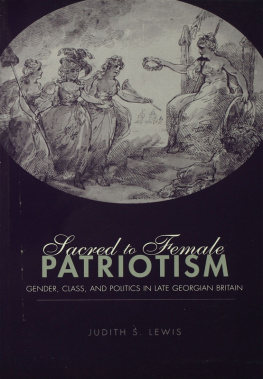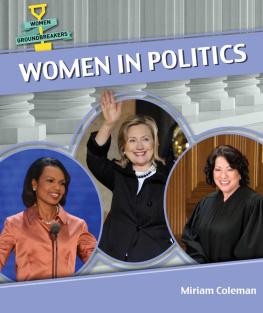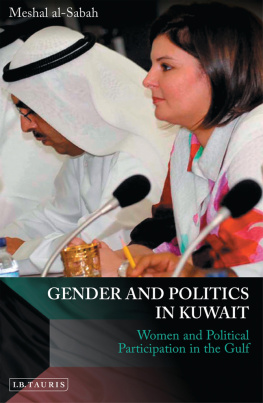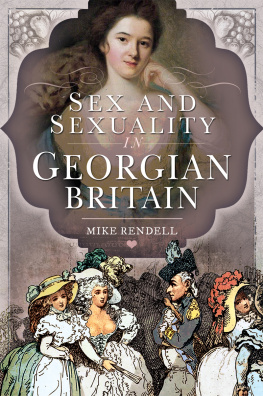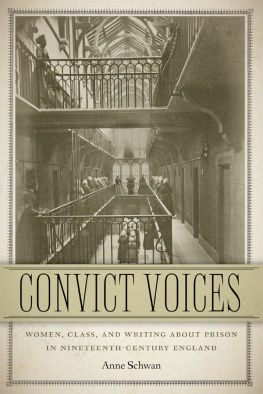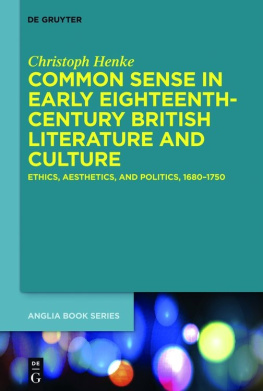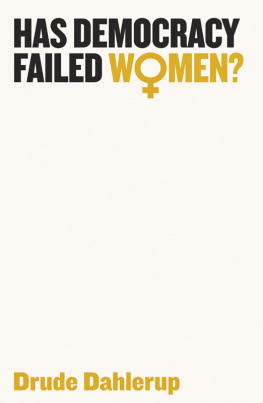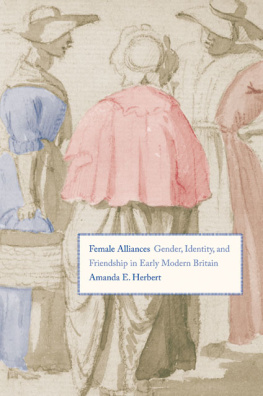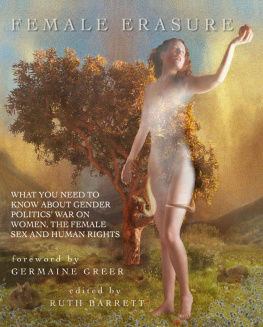Published in 2003 by
Routledge
29 West 35th Street
New York, NY 10001
www.routledge-ny.com
Published in Great Britain by
Routledge
11 New Fetter Lane
London EC4P 4EE
www.routledge.co.uk
Copyright 2003 by Taylor & Francis Books, Inc.
Routledge is an imprint of the Taylor & Francis Group.
Printed in the United States of America on acid-free paper.
All rights reserved. No part of this book may be reprinted or reproduced or utilized in any form or by any electronic, mechanical, or other means, now known or hereafter invented, including photocopying and recording, or in any information storage or retrieval system, without permission in writing from the publishers.
10 9 8 7 6 5 4 3 2 1
Library of Congress Cataloging-in-Publication Data
Lewis, Judith Schneid, 1950-
Sacred to female patriotism : gender, class, and politics in late Georgian Britain / Judith S. Lewis.
p. cm.
Includes bibliographical references and index.
ISBN 0-415-94411-2 ISBN 0-415-94412-0 (pbk.)
1. Women in politicsGreat BritainHistory. 2. Upper class womenGreat BritainPolitical activityHistory. 3. Aristocracy (Social class)Great BritainHistory. 4. Great BritainPolitics and government18th century. 5. Great BritainPolitics and government19th century I. Title
HQ1236.5.G7L49 2003
305.420941dc21
2002036987
Acknowledgements
As with most books, writing this one was as much a labour of love as it was, at rarer times, simply an act of labour. At those tougher moments, the female patriots themselvesand the two hundred years of silence or derision they have receivedkept me going. More often, it was my own contemporaries who did so, whether students, colleagues, family members, friends, or even those I met casually, on buses, trains, and planes, who had the misfortune of asking what I did for a living. The look of shocked disbelief when I told them that there once had been a time when some women had political power was always followed by the query Why didnt I know? You will soon seemed the safest response, although later rather than sooner would have been closer to the truth, at least as far as the present book was concerned.
This book could not have been written without the enormous assistance provided by the University of Oklahoma, both as an institution and as a collection of supportive individuals. I would like to notice my colleagues Sandie Holguin and Gary Cohen (recently translated to the University of Minnesota) who read early chapters and whose discerning criticisms got me well-launched on the project. A graduate seminar and my women colleagues acting in the guise of a seminar helped clarify my thinking on the famous Westminster election of 1784. Cathy Kelly and Gwenn Davis assumed the most daunting of tasks, reading those all-important almost-finished versions of the entire manuscript. They let me know just how far from completion I really was, while providing the emotional, intellectual, and moral support that made really finished a realistic possibility. The book very much bears the stamp of their keen, though very different, intellects.
H. Wayne Morgan, an earlier department chairman, consistently contributed his interest, sympathy, and wit, while the present chair, Rob Griswold, has readily and cheerfully provided whatever practical assistance I sought. So too, Paul Bell, Dean of Arts and Sciences, who almost miraculously came through at a moments notice whenever I thought it was necessary for him to do so! The universitys Research Council has been generous in its funding, as has the Oklahoma Foundation for the Humanities. Office staff are always the unsung heroines of academic departments. Yet none of our work, including the present volume, could be accomplished without their assistance, expertise and support. Luci Gouin, Suzi Goerlach, Rhonda George, and most of all Barbara Million richly deserve my thanks.
Outside the university I have also been blessed with many supportive friends. Amanda Vickerys early enthusiasm and endorsement have been more helpful than she will ever know; a corridor conversation with John Styles led me down unanticipated historical highways. Peter Mandlers trenchant commentary helped me think through a variety of issues. Richard Davis has contributed his erudition along with his greatly appreciated friendship and support, especially at times when it was most needed.
A Fletcher Jones Fellowship enabled me to spend some precious months at the Huntington Library in San Marino, California. A paradise for Anglophiles, the Huntingtons superb collection of British manuscripts and rare books, personable and professional staff, and international community of distinguished scholars provide a welcome refuge for those of us who exist in a state of permanent exile from the eighteenth century. I remain exceedingly grateful for the opportunity of working there.
In Britain my work took me to what are now some of the worlds finest archives. The New British Library was undoubtedly called into existence to redress the grievances of the Old. So, too, the not-quite-so-new Public Records Office at Kew. The incomparable collections of both institutions are finally housed in comparably fine facilities. The staff at the wonderful Borthwick Institute for Historical Research ensured that a prolonged stay in York was pleasurable as well as productive. Peter Day, Keeper of Collections at Chatsworth, went far beyond the call of duty in seeing to it that I was comfortably settled during my stint in Derbyshire.
A good bit of the work for the book was also done at Britains superb county records office. Staff at the Norfolk Records Office, Norwich; Leicestershire Records Office, Leicester; Northamptonshire Records Office, Northampton; North Yorkshire Records Office, Northallerton; West Sussex Records Office, Chichester; Devonshire Records Office, Exeter; Greater London Records Office, London; Hertfordshire Records Office, Hertford; and West Suffolk Records Office, Bury St. Edmunds, all handled my requests with alacrity and my presence with grace. All deserve my sincerest thanks.
Finding portraits to illustrate the book, my most recent task, afforded a greater change of pace than I had anticipated. That challenge was made immeasurably easier by the array of assistance I received. The Earl of Halifax and his secretary, Mrs. Spink, graciously hosted a visit to Garrowby so that I might choose an appropriate portrait of his ancestor Lady Irwin. And that excursion would not have happened had not the staff of the City of Leeds, from its Web site to designer to the curator at Temple Newsam, put me onto the right track. I was frankly amazed at the efforts they would go to to help an invisible and unknown American scholar. Lord Sandys generously shared with me an engraving of his notable ancestor, Mary Sandys Downshire. I appreciate the trouble he went to and sincerely hope the book doesnt disappoint: Lady Downshires hat was certainly all that he promised. The able and amiable staffs of the Heinz Archive at the National Portrait Gallery and the Witt Collection at the Courtauld helped me track down the pictures I hoped were in existence, thus rescuing some female patriots from collective obscurity. Mark Bills, Curator of Drawings at the Museum of London, was unusually generous with his time. We spent a delightful morning enjoying a wealth of political cartoons in that remarkable collection.

